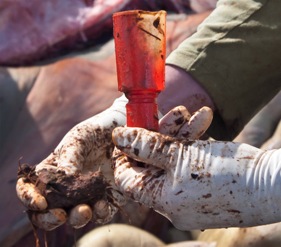Gray whale necropsy reveals trash inside stomach
Apr/20/10 04:32 PM

The public should give many thanks to the necropsy team for performing this incredibly important and physically strenuous work. Due to their dedication and efforts, we are now aware of the role that pollution may have played in the death of this whale - as it indeed impacts all our marine life. Plastics that end up in our waters never go away - they eventually end up as micro particles which absorb contaminants and enter the marine food chain, causing deformities and disease. It is well known that our local seals and orcas are laced with pcbs and other toxic chemicals. Depletion of food sources caused by commercial overfishing and pollution can be reversed by getting involved. You CAN make a difference - pick up trash on the beach, don’t purchase seafood on the seafood watch list and ask your grocer not to sell it, help clean up the Sound.
As an observer, our volunteer was stunned at the amount of trash that was removed from the whale - and overwhelmed with sadness that human impact had, in any way, contributed to this whale’s demise. Please learn more about our polluted waters and the Great Pacific Garbage Patch, an oceanic swirling mass of plastic twice the size of Texas, on Seal Sitters’ website. Educate people about the dangers of pollution and its tragic impact on our wildlife now and for generations to come. Make a commitment that this magnificent whale’s life was not given in vain.
See news video here.
Read Lynda Mape’s excellent article in the Seattle Times.







